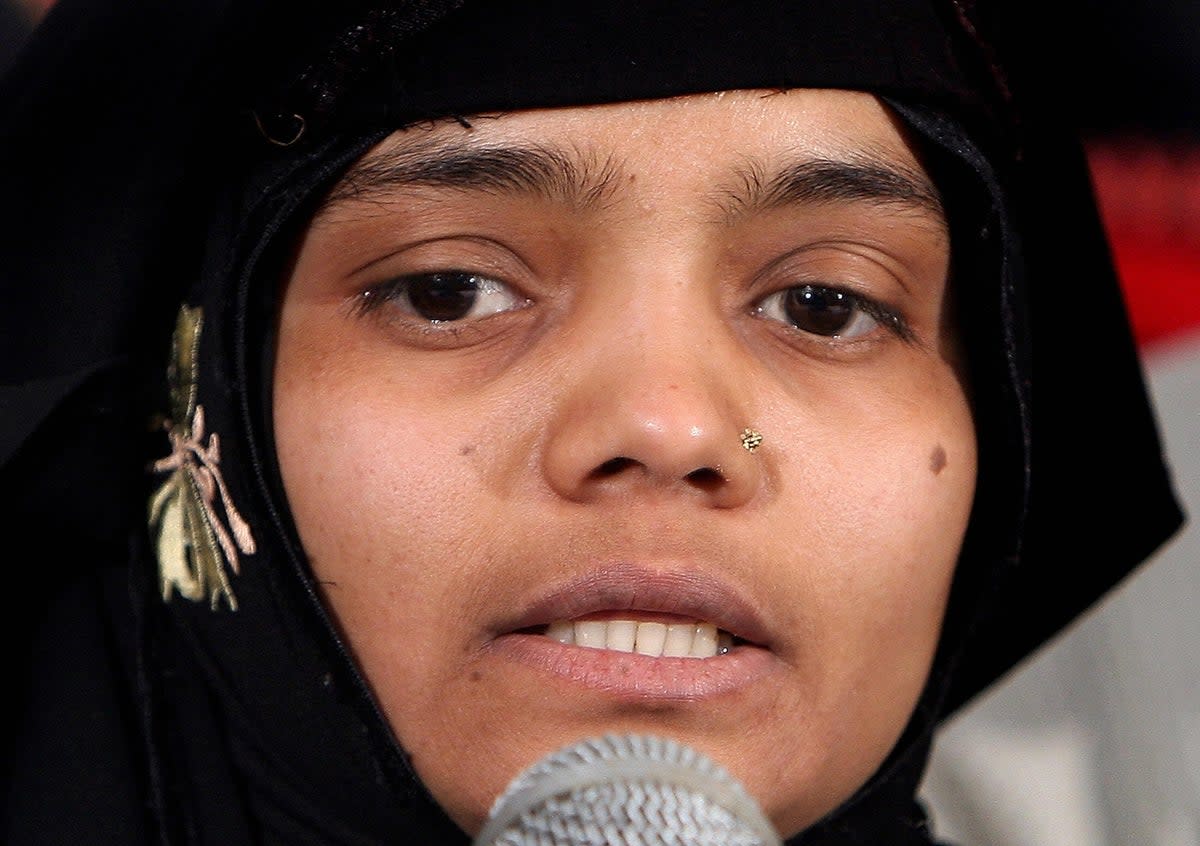‘How can justice for any woman end like this?’: Bilkis Bano says release of rapists left her ‘numb’

Bilkis Bano, the Indian Muslim woman who was gang-raped during the 2002 Gujarat riots, has expressed that she is “still numb”, days after 11 men convicted for the gruesome act were freed.
Ms Bano, who was 21 years old and five months pregnant in March 2002, has had to come to terms with the murder of seven of her family members, including her three-year-old daughter, at the time apart from being the survivor of one of the most horrendous rape cases that had occurred during the riots.
The decision to release the 11 men convicted for the gang-rape and the murder of her family members was announced when India celebrated its 75th Independence Day on 15 August, the same day the country’s prime minister – at the time the chief minister of the Gujarat state – called for an end to misogyny.
Now, Ms Bano has expressed her disappointment with the Indian government.
“Today, I can say only this – how can justice for any woman end like this?” Ms Bano said in an emotional statement, two days after their release.
“Two days ago, on August 15, 2022, the trauma of the past 20 years washed over me again,” Ms Bano said.
“When I heard that the 11 convicted men who devastated my family and my life, and took from me my three- year old daughter, had walked free, I was bereft of words. I am still numb,” Ms Bano continued.
“Today, I can say only this – how can justice for any woman end like this? I trusted the highest courts in our land. I trusted the system, and I was learning slowly to live with my trauma. The release of these convicts has taken from me my peace and shaken my faith in justice. My sorrow and my wavering faith is not for myself alone but for every woman who is struggling for justice in courts.”
“No one enquired about my safety and well-being, before taking such a big and unjust decision,” Ms Bano pointed out.
She has now appealed to the Gujarat government to “please undo this harm”.
“Give me back my right to live without fear and in peace. Please ensure that my family and I are kept safe,” she pleaded.
“They are Brahmins,Men of Good Sanskaar. Their conduct in jail was good": BJP MLA #CKRaulji who was on the panel that recommended release of 11 convicts who gang-raped #BilkisBano & killed her child. @ashish_ramola from the ground.
Full interview here: https://t.co/uyPBGyRRnr pic.twitter.com/WRWZ6PjVMh— Mojo Story (@themojostory) August 18, 2022
On social media, several images and videos of the convicts being offered sweets went viral.
The application for remission of the life sentence for the convicts was considered due to the “completion of 14 years” in jail and other factors like “age, nature of the crime, behaviour in prison and so on”, according to a top Gujarat state government officer.
One state lawmaker of the ruling Bharatiya Janata Party, CK Raulji, who was on the panel that recommended the release of the 11 convicts, referred to the convicts as having “good values” and invoked their caste.
“They [convicts] are Brahmins, men of achche sanskaar [good values]. Their conduct in jail was good,” he said in an interview in Hindi to news portal Mojo Story.
The caste system in India has resulted in widespread discrimination against lower castes across the country. The Brahmin caste grouping referred to by Mr Raulji is the top of the caste hierarchy.


